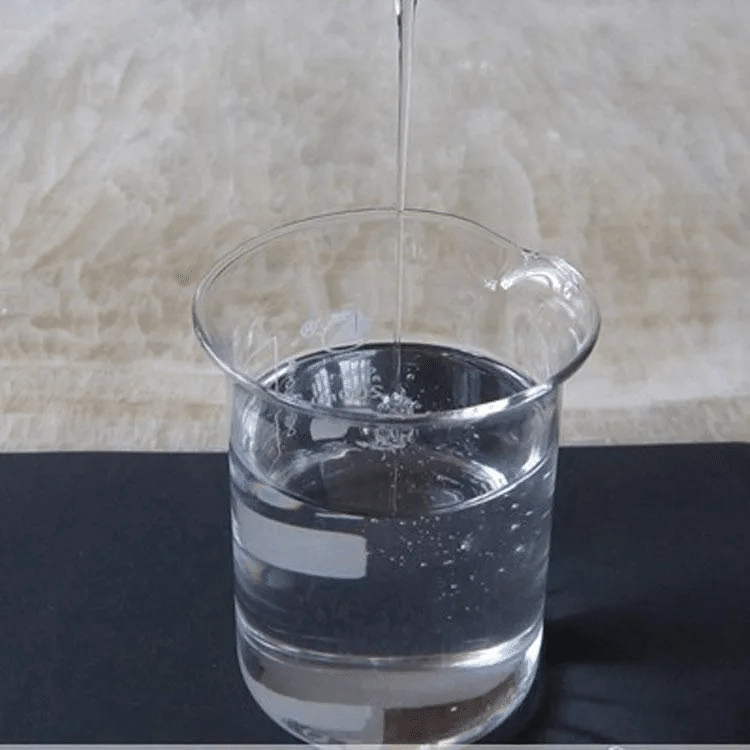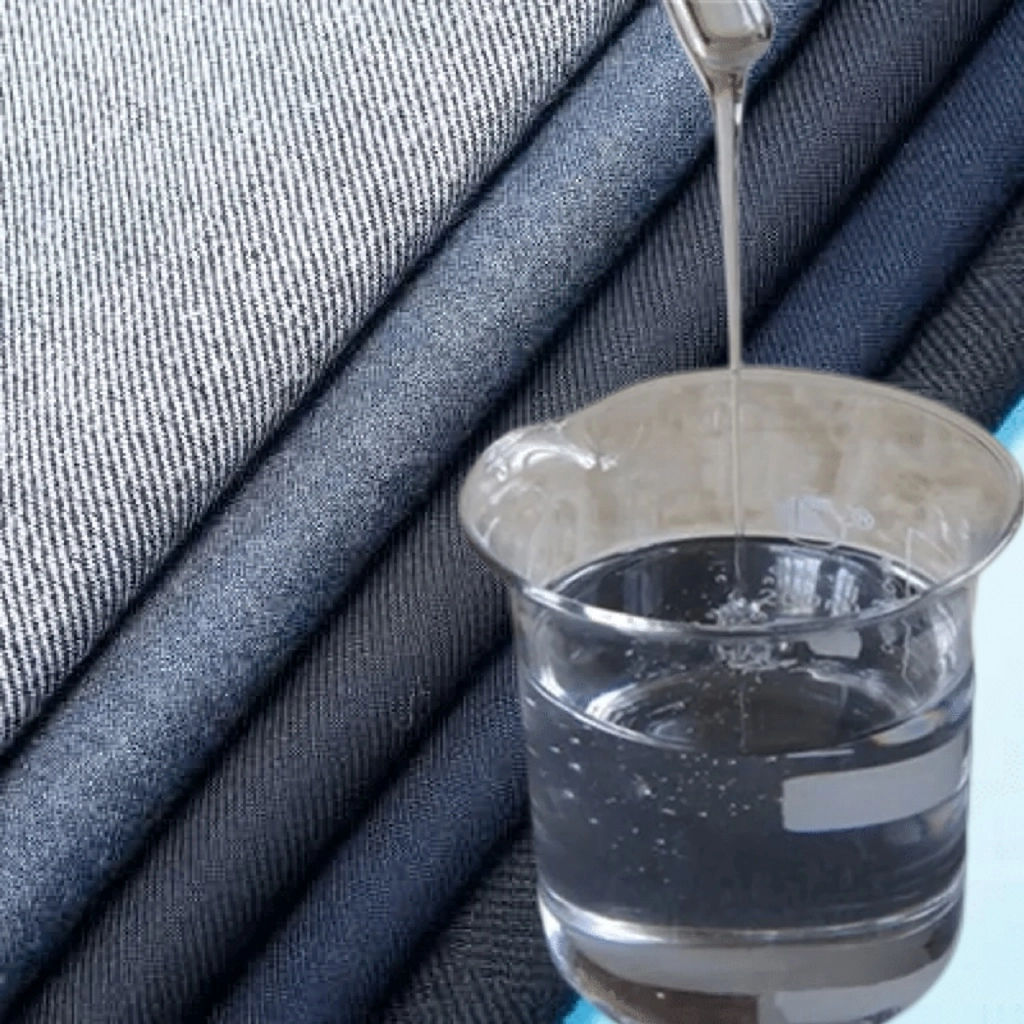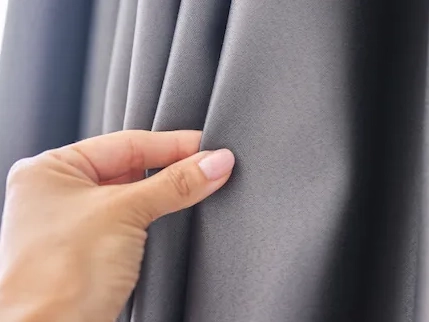في تشطيب القماش, منعم زيت السيليكون يعد التطبيق الآن أحد الممارسات الرئيسية لتحسين ملمس النسيج وراحة الارتداء. بالنسبة للمواد المختلفة مثل القطن والبوليستر والنايلون وغيرها، فإن تركيز زيت السيليكون المختار له تأثيرات مباشرة على نعومة النسيج وقابلية الماء والثبات والمتانة للمنتج. كما أن شركة بلولاكشيم الرائدة في تصنيع المواد المساعدة للنسيج توفر مجموعة من زيوت السيليكون عالية الأداء لمنتجي المنسوجات على مستوى العالم ويساعد العملاء على تحديد معلمات كثافة زيت السيليكون الصحيحة بدقة وفقًا لاحتياجات المعالجة وأنواع الأقمشة لتحقيق أفضل تأثير تشطيب.
ما هي كثافة زيت السيليكون؟
تشير كثافة زيت السيليكون عادةً إلى كتلته لكل وحدة حجم، والوحدة المطبقة هي g/سم مكعب. وهي إحدى الخواص الفيزيائية المستخدمة لتحديد وزن زيت السيليكون. وهي لا تؤثر فقط على درجة التصاق زيت السيليكون على القماش، ولكن لها أيضًا علاقة مباشرة بخاصية التشتت والملمس الناعم والنعومة وثبات المستحلب.

- زيت السيليكون منخفض الكثافة: سيولة جيدة، وسهولة الاختراق، ومناسب للأقمشة الرقيقة أو التطبيقات التي تتطلب نعومة معززة.
- زيت السيليكون عالي الكثافة: سلاسل جزيئية أطول أو تراكيب أكثر تعقيدًا، ونعومة أقوى، ومناسب للأقمشة الثقيلة أو احتياجات التشطيب التي تسعى إلى الحصول على ملمس أكثر امتلاءً
سيؤثر استخدام زيت السيليكون غير المناسب على الأداء العام للنسيج:
- كثافة عالية جدًا: قد يسبب ملمسًا "دهنيًا" ونفاذية ضعيفة.
- كثافة منخفضة للغاية: قد ينتج عنها نعومة غير كافية وتأثير معالجة النسيج لا يدوم طويلاً.
لذلك، فإن الاختيار العقلاني لـ زيت السيليكون تُعد الكثافة والمطابقة العلمية مع أنواع الأقمشة والمتطلبات الوظيفية وطرق المعالجة خطوات أساسية لمصانع الملابس الجاهزة ومصانع الصباغة والتشطيب لتحسين جودة المنتج وكفاءة المعالجة.
خمسة تأثيرات رئيسية لكثافة زيت السيليكون على أداء المنسوجات
التحكم في ملمس اليد: كلما كانت الكثافة أعلى، كلما كانت النعومة أكثر وضوحًا؛ أما الكثافة المنخفضة فهي أكثر ملاءمة للبشرة وطبيعية ومناسبة للملابس الضيقة.
الاختراق والتوحيد: منخفضة الكثافة زيت السيليكون يجعل من السهل اختراق بنية الألياف وهو مناسب للألياف أو الأقمشة خفيفة الوزن.
ثبات المستحلب: زيت السيليكون ذات الكثافة المعتدلة تساعد على تكوين نظام مستحلب مستقر وتحسن مقاومة القص وأداء التخزين للمواد المضافة في العملية.



تأثير الضوء الملون: قد يسبب زيت السيليكون عالي الكثافة اختلافات في اللون على الأقمشة الداكنة، بينما يمكن لزيت السيليكون المحب للماء أن يقلل من تغيرات الضوء اللوني.
توافق العملية: زيوت السيليكون ذات الكثافات المختلفة درجات مختلفة من القدرة على التكيف مع عمليات التشطيب مثل تثبيت اللون والتنعيم. يمكن أن توفر BLUELAKECHEM حلول زيت السيليكون المخصصة للتكيف مع خطوط الإنتاج الآلية
اختلافات الاستخدام لأنواع مختلفة من كثافة زيت السيليكون المختلفة
زيت السيليكون الأميني
- خصائص الكثافة: متوسطة إلى عالية
- الاستخدام الموصى به: مناسب للأقمشة الممزوجة من القطن والبوليستر التي تتطلب نعومة عالية وملمس ناعم
- مزايا المنتج: تفاعل قوي، وترابط قوي مع الأقمشة، وتأثير يدوم طويلاً بعد التشطيب

زيت السيليكون المحب للماء
- خصائص الكثافة: منخفضة نسبيًا
- الاستخدام الموصى به: المنتجات التي تحتاج إلى مراعاة كل من الرطوبة والنعومة مثل ملابس الأطفال والأقمشة الرياضية
- مزايا المنتج: ناعم ولا يؤثر على امتصاص الماء، أخضر وصديق للبيئة، ويلبي معايير OEKO-TEX

زيت سيليكون الكتلة
- خصائص الكثافة: كثافة متوسطة ومنخفضة الكثافة، بنية متوازنة
- الاستخدام الموصى به: تشطيب أقمشة الألياف الكيميائية مثل الحرير والبوليستر والنايلون
- مزايا المنتج: مقاومة القص في درجات الحرارة العالية، وثبات جيد للمستحلب، مما يمنح الأقمشة مرونة ومرونة جيدة

شركة BLUELAKECHEM، مورد محترف لمواد النسيج المساعدة، يوفر لك خدمة شخصية خدمات تخصيص تركيبة زيت السيليكون ويمكنه ضبط المعلمات مثل كثافة المنتج، وقيمة الأس الهيدروجيني، وثبات القص، وما إلى ذلك وفقًا لمتطلبات العملية الخاصة بك لضمان أفضل تأثير تكييف.
خاتمة
لا تُعد كثافة زيت السيليكون مجرد معيار فحسب، بل تؤثر بشكل مباشر على ملمس المنسوجات وثباتها وقابليتها للغسيل ومظهرها العام. في مجال المواد المساعدة للمنسوجات، لا يوجد زيت سيليكون عالمي، فقط الحل الأنسب من حيث الكثافة ومطابقة الهيكل. من خلال فهم الاختلافات في كثافة الأنواع المختلفة من زيت السيليكون، يمكنك اختيار منتجات زيت السيليكون ذات الكثافة المناسبة بشكل علمي أكثر، مما يمكن أن يحسن بشكل كبير من جودة تشطيب الأقمشة ويزيد من القيمة المضافة للمنتج.

بلويلاكشيم ملتزمة بتوفير محاليل زيت السيليكون عالية الجودة للعملاء في جميع أنحاء العالم. سواءً كنت تستهدف الملابس أو المنسوجات المنزلية أو الأقمشة الوظيفية أو المنسوجات الصناعية، يمكننا أن نصمم لك تركيبات فعالة لمساعدتك في ترقية منتجاتك. اتصل بنا لتخصيص محلول زيت السيليكون الحصري الخاص بك.

